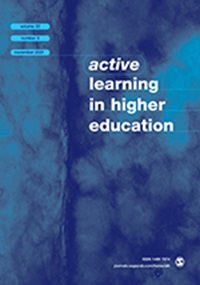同伴何时以及如何激发参与理想的困难:学生对辅助教学有效性的看法
IF 3.2
1区 教育学
Q1 EDUCATION & EDUCATIONAL RESEARCH
引用次数: 0
摘要
补充教学,又称同伴辅助学习课程(SI-PASS),是一种行之有效的同伴学习形式,已在全球各地的高等教育机构中实施,并为参与者带来了学习收益。虽然对学习收益的影响已经通过准实验进行了广泛的研究,但对 SI-PASS 有效的内在机制却不甚了解。本研究探讨了学生们认为 SI-PASS 能够带来哪些益处,以及是通过哪些机制实现的。我们通过采访 14 名参加过 SI-PASS 现场实验的学生来研究这一点,该实验可靠地发现了 SI-PASS 对成绩的显著影响。我们要求学生进一步说明他们是否以及为什么认为 SI-PASS 是有效的。主题分析和独立编码显示出三个主要驱动因素的相互作用。SI-PASS之所以有效,是因为它激发了学生使用有效的学习技巧和社会学习。教学氛围降低了参与协作学习和有效学习技巧的门槛,从而促进和加强了这些驱动因素。这些研究结果有助于明确在为 SI 领导者做准备时应强调哪些因素,以及在实施或研究 SI-PASS 时应监测和测试哪些方面。本文章由计算机程序翻译,如有差异,请以英文原文为准。
When and how do peers stimulate engaging in desirable difficulties: Student perspectives on the effectiveness of supplemental instruction
Supplemental instruction, also known as Peer Assisted Study Sessions (SI-PASS), is a well-established form of peer learning that has been implemented in higher education institutions across the globe and that coincides with learning gains for participants. While the effects on learning gains have been extensively studied with quasi-experiments, the underlying mechanisms that make SI-PASS effective are less well understood. This study explored what benefits students thought SI-PASS offered and through which mechanisms. We studied this by interviewing 14 students who participated in SI-PASS during a field experiment that reliably found a significant impact of SI-PASS on performance. The students were asked to expand on if and why they thought SI-PASS was effective. Thematic analysis and independent coding indicated an interplay of three main drivers. SI-PASS was experienced as effective because it stimulated the use of effective study techniques and social learning. These drivers were facilitated and enhanced by a pedagogical climate that lowered the threshold to engage in collaborative learning and effective study techniques. These findings could help pinpoint what elements should be highlighted during the preparation of SI-leaders and what aspects should be monitored and tested when implementing or studying SI-PASS.
求助全文
通过发布文献求助,成功后即可免费获取论文全文。
去求助
来源期刊

Active Learning in Higher Education
EDUCATION & EDUCATIONAL RESEARCH-
CiteScore
13.20
自引率
12.00%
发文量
31
期刊介绍:
Active Learning in Higher Education is an international, refereed publication for all those who teach and support learning in higher education (HE) and those who undertake or use research into effective learning, teaching and assessment in universities and colleges. The journal is devoted to publishing accounts of research covering all aspects of learning and teaching concerning adults in higher education. Non-discipline specific and non-context/country specific in nature, it comprises accounts of research across all areas of the curriculum; accounts which are relevant to faculty and others involved in learning and teaching in all disciplines, in all countries.
 求助内容:
求助内容: 应助结果提醒方式:
应助结果提醒方式:


